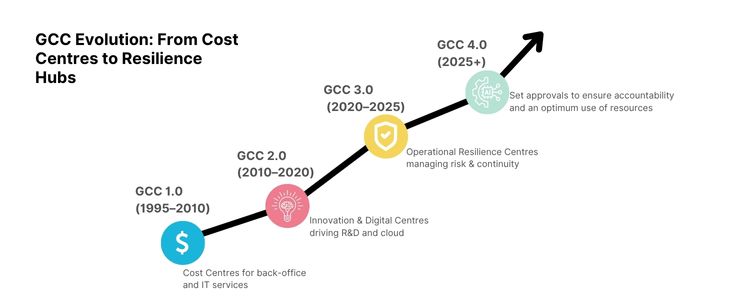India’s economy, which was once known for its agricultural spine and traditional industries, entered the field of digital services in the early 1990s. At that time, outsourcing and call centers were symbols of the first phase of the integration of India into global supply chains.
By the early 2000s, the rise of the Global Distribution Centres (GDC) and the Global Capability Centres in India turned it into the world’s back office, providing IT, BPO and support services to multinational corporations (MNCs). These early GCC costs focused on intercourse and transaction assistance.
In the 2010s, India’s GCC landscape matured. Multinational companies began setting up the Centre for Excellence (CO), focusing on research, product engineering, data science, and digital changes. The Indian GCC workforce developed as a strategic asset.
India now has more than 1,900 GCCs, of which 18 lakh are professionally functioning. These centers contribute more than $64 billion annually to the Indian economy. The GCC is no longer just operating units. These have become AI-powered, strategic operational flexibility centers and commercial continuity centers, protecting business continuity hubs from disruptions.
In the upcoming future there will be Gcc growth in Tier-2 and Tier-3 cities, run by digital sovereignty and talented innovation, and they are ready to become the center of global flexibility strategies.
| Economic Resilience Pillar |
Role of GCCs in India |
Strategic Impact |
| Operational Redundancy |
Multi-location GCCs in tier-1, tier-2, and tier-3 cities |
In-built operational continuity & failover |
| Digital Sovereignty Enablement |
Secure data processing & cloud operations from India-based GCCs |
Ensures data localisation and compliance |
| Business Continuity Command |
GCCs function as global business continuity centres. |
Real-time continuity management |
| Cybersecurity Resilience |
24×7 SOCs integrated into GCCs |
Protects digital platforms from cyber threats |
| AI-Driven Risk Intelligence |
AI-powered risk monitoring, scenario planning |
Predictive disruption management |
| Regulatory Compliance Resilience |
GCCs manage evolving regulations like GDPR, DPDP, and global finance laws. |
Fast multi-country compliance support |
| Innovation Hubs & CoEs |
GCCs drive AI, data, and cloud R&D via Centres of Excellence. |
Accelerates digital innovation & product development |
| Geopolitical Risk Buffer |
Operations shifted to India as a stable base. |
Reduces exposure to global instability |
frequently asked questions (FAQs)
1.
Why is GCC considered to be the operational flexibility center?
Modern GCCs operating in India act as excessive centers and professional continuity command centers, which also ensure uninterrupted operations during global disruptions such as disruptions in the supply chain, geopolitical risks, or cyber threats.
2.
Why are companies expanding GCC in Tier-2 and Tier-3 Indian cities?
To manufacture multi-site operational excesses, access cost-effective talent, and decentralise risk, multinational companies are investing rapidly in the development of GCC in Coimbatore, Indore, and Visakhapatnam, like Tier-2 and Tier-3 cities.
3.
How do GCCs contribute to digital sovereignty?
GCC data ensure localisation, process sensitive information within the Indian regulatory structure (e.g., the DPDP Act), and safely manage cloud operations, making them important to maintain digital sovereignty.
4.
What economic benefits does GCC provide in India?
India offers 40% of operating costs, access to a huge AI-skilled workforce, world-class digital infrastructure, tax encouragement, and a stable geopolitical environment—which makes it ideal for building commercial continuity centers.
5.
Why is GCC important for commercial continuity?
GCCs act as strategic backups and command centers for global operations, allowing businesses to continue important tasks during disruption, ensuring business continuity and operational flexibility.
Aditi
Aditi, with a strong background in forensic science and biotechnology, brings an innovative scientific perspective to her work. Her expertise spans research, analytics, and strategic advisory in consulting and GCC environments. She has published numerous research papers and articles. A versatile writer in both technical and creative domains, Aditi excels at translating complex subjects into compelling insights. Which she aligns seamlessly with consulting, advisory domain, and GCC operations. Her ability to bridge science, business, and storytelling positions her as a strategic thinker who can drive data-informed decision-making.



















